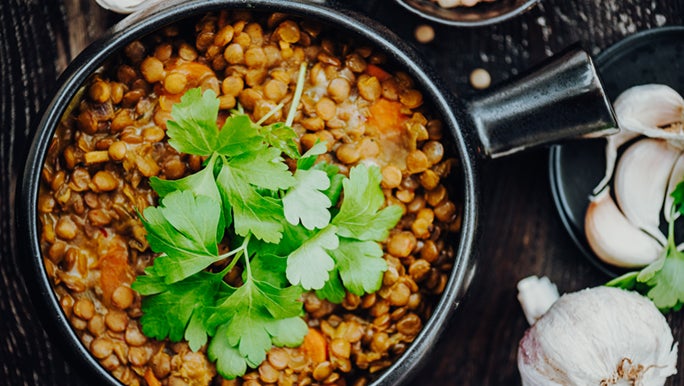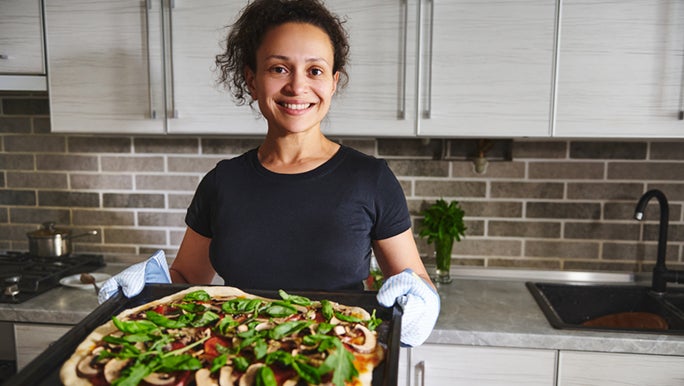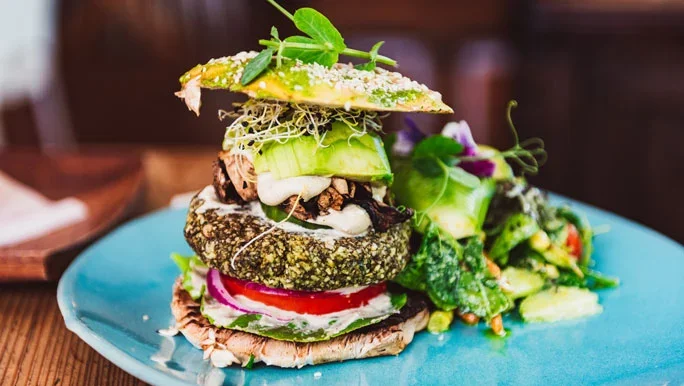Considering a plant-based diet? No, it doesn't mean chomping on tasteless “rabbit food”. Vegan diets could easily feature a variety of foods if you know what you need to include to cover your nutritional needs.
Thankfully, we have Kate Agnew, Dietitian, to discuss some of the ways you could increase your plant-based foods and what you might need to know about how to go on a vegan diet.
What is plant-based eating?
Kate explains plant-based eating is “…an umbrella term that covers a few ways of eating to incorporate more plant-based foods.”
Understanding the differences between plant-based diets and vegan diets is a good way to identify something that fits with your lifestyle. Add in flexitarian meal ideas and you could find a variety of ways to move towards a higher intake of plant-based foods.
If you’ve ever wondered “is David Attenborough a vegan?”, it's interesting to note that even the famous environmentalist has a more flexitarian approach to eating.

If going 100% vegan is a bit intimidating, you could still pledge to eat more plants.
Why is plant-based eating good for me?
Eating plenty of fruit and vegetables is always good, but more is being understood about the potential benefits of a plant-based diet on your gut health. By increasing the diversity of the bacteria in your gut, known as your gut microbiome, you’re potentially increasing the support to your overall health.
Studies also highlight the benefits for the planet. Plant-based production generates less greenhouse gases compared to animal products. It also requires fewer croplands and uses less water.
How can you get all the nutrients you need?
“The focus of your diet should be on wholefoods including fruits, vegetables, wholegrains, legumes, nuts, etc,” says Kate.
She advises that it’s important to know the at-risk nutrients to ensure you meet your nutritional requirements through certain foods.
When thinking about vegan nutrition, Kate shares four key areas to remember:
Vitamin B12
“B12 is essential for brain, nervous system and cell development. As it’s largely found in animal foods, it’s hard to meet your requirements, therefore a supplement may be required,” says Kate.
Try fortified nutritional yeast sprinkled on your salad or look for a breakfast cereal that is fortified with B12.
Calcium
Calcium, usually found in dairy milk, could also be found in hard tofu, almonds and green leafy vegetables like kale and Asian greens.
Zinc
Zinc is important for the tissues throughout the body and specifically the immune system. Good sources of zinc include whole grains, tofu, tempeh, legumes, nuts and seeds.
Protein
“Most people think of meat when they hear protein. Plant-based eating means paying attention to plant-based proteins so you consume enough,” explains Kate.
High protein vegan meals include legumes and lentils such as falafel or a bean-based chilli.

High protein vegan meals include legumes and lentils such as falafel or a bean-based chilli.
Kate’s top tip – variety is key
“A well planned plant-based diet will include a good variety of foods to make sure your nutrient requirements are met,” Kate says.
Look at what vegetables are in season now and think about ways of making vegetables fun for the kids.
All sorts of plant-based meats are available in the shops for vegan protein meals. We’ve also looked at some of the best vegan milk alternatives for you, so there are plenty of options to keep up that variety.

It’s important to know the at-risk nutrients to ensure you meet your nutritional requirements through certain foods.
It doesn’t have to be “all in” at once
If going 100% vegan is a bit intimidating, you could still pledge to eat more plants.
A good aim is to include 30 different plants over the week. For example, you could try five types of grains, five different fruits, ten different vegetables, five different legumes, a few different nuts and extra virgin olive oil.
If you’re struggling in any nutritional areas, be sure to speak with your health professional for support.
Related:
Kate Agnew is an Accredited Practising Dietitian who is passionate about innovation and problem-solving in health & nutrition. Her goal/aim is to ultimately create a healthier environment for all Australians.
Reviewed by the healthylife Advisory Board November2021.



